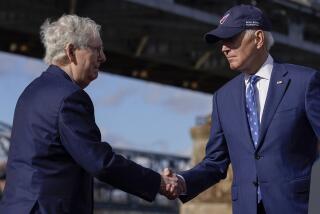Honeymoon? Or a Shaky Marriage? : Clinton/Congress harmony vows will be tested
- Share via
The urgent need to end governmental “gridlock” in Washington was a theme in this year’s presidential election, echoing the public’s dismay over the inertia produced by years of divided government. The election results--putting both the White House and Congress in Democratic hands for the first time in 12 years--offer a way around this legislative impasse. Or do they?
Certainly the end of divided government removes a primary excuse for inaction in key areas where the public demands movement. For the next two years at least it won’t be possible to blame narrow partisanship for sabotaging this or that worthwhile initiative. The American public will expect performance.
NEW PARTNERSHIP: This week’s highly publicized meeting in Little Rock between President-elect Bill Clinton and Democratic congressional leaders was from all appearances an effort to forge a new partnership for getting things done. But as in all partnerships, success can’t be gauged until the enterprise opens for business and the partners’ ability to work together is tested under real-life conditions.
Alas, promising “to make government work again” is easy; achieving the needed cooperation is not. The presidency and Congress are markedly different institutions. Inevitably, conflicts between them arise regardless of which party controls the legislature or the White House. The President uniquely has a national constituency, while the 535 members of Congress tend to give primacy to the interests of the districts and states they represent--or to the narrower interests of the groups whose money often fuels their campaigns. And the President and Congress often work on different timetables. “I will be in a hurry,” said Clinton this week when he promised a new era in government. But Congress, with its committee hearings and its tradition of extensive or--in the Senate’s case--unlimited debate, marches to a slower beat. Finally, the President embodies only one political ego; Congress is an entire village of egos.
OLD BARRIERS: For all the political pitfalls, an opportunity for constructive teamwork certainly is at hand. There’s a clear consensus on the need for an economy-stimulating program as a first order of business. There’s agreement that the deficit must be brought down and the health care system drastically overhauled. A compromise may even be in the works on Clinton’s hope for line-item veto power to allow him to eliminate certain spending programs. House Speaker Thomas S. Foley now talks of backing this grant of power, though making it subject to an override by a simple majority, rather than a two-thirds vote.
But a consensus on goals isn’t the same as a consensus on means. Here is where the gritty political reality of negotiation, compromise, trade-offs must come into play. No less real, however, is the impatience of a public that feels its government has for too long failed to deal with vital issues. If it was nothing else, the election was a mandate for change. A Congress that fails to act on that mandate will be a Congress asking for trouble.
More to Read
Get the L.A. Times Politics newsletter
Deeply reported insights into legislation, politics and policy from Sacramento, Washington and beyond. In your inbox twice per week.
You may occasionally receive promotional content from the Los Angeles Times.










